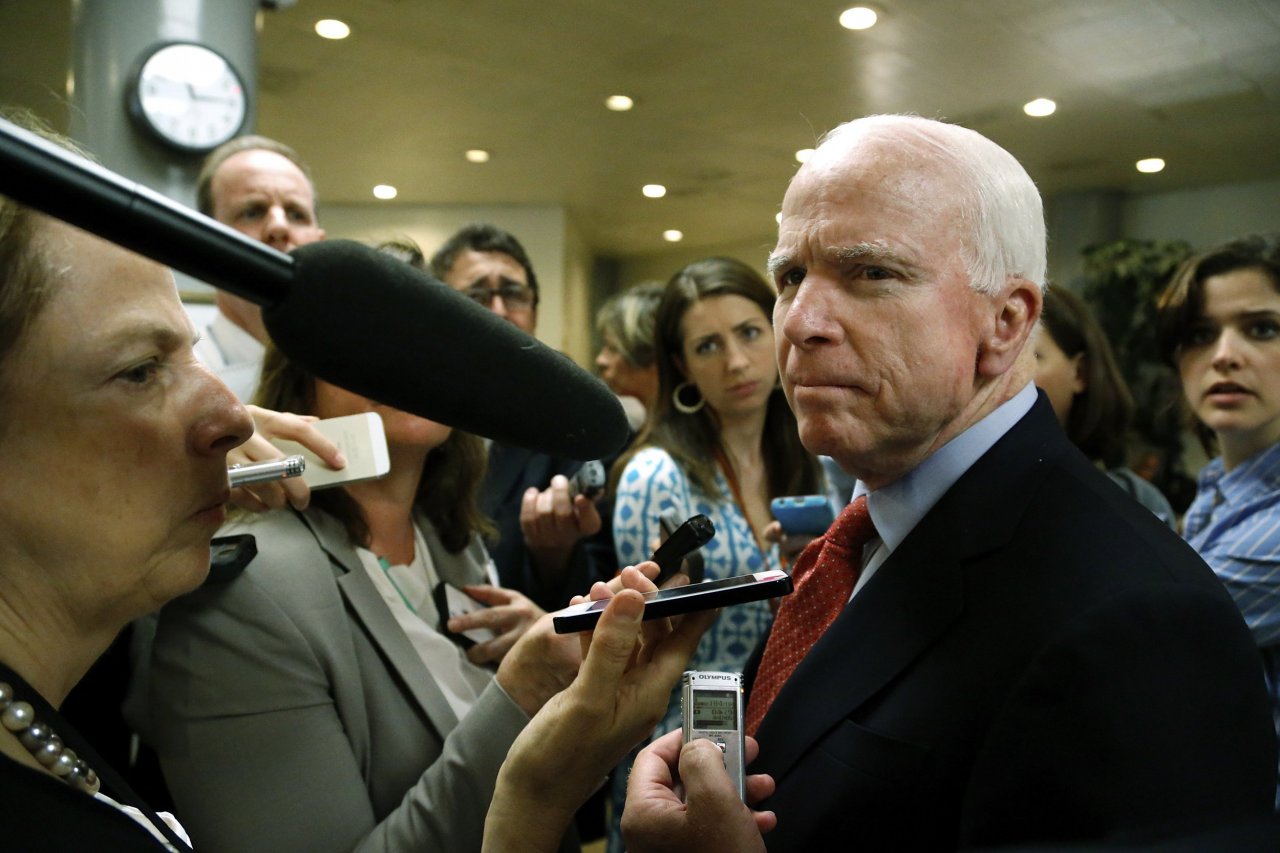Get ready to rumble: John McCain is oiling up to enter the ring as the Republicans' heavyweight champ on the Senate Armed Services Committee. After Republicans won control of the Senate in Tuesday's midterm elections, the party was virtually certain to award McCain, their leader on defense and foreign policy issues, chairmanship of the committee—a perch that will give the outspoken hawk far more opportunities to demonstrate not only his expertise in military affairs but also his legendary hot temper, impatience with rivals and blunt-spoken refusal to suffer lightly those he considers fools, no matter how high their rank or title.
If his past behavior is any guide—and with the long-serving McCain, it certainly is—the Arizonan's fuse for the fireworks is already lit. All his pet issues, which include deploying at least some U.S. ground troops to take on ISIS militants in Iraq and Syria and going after "wasteful" spending on things like the F-35 fighter jet and the littoral combat ship, are likely to stay at the top of McCain's agenda come January. "He's a virulent actor," Joshua Huder, an expert on Congress at Georgetown University's Government Affairs Institute, told Newsweek. "At hearings, he likes to be seen as the straight-talking arbiter of conservative truth. I suspect we're going to see a lot more contentious hearings, and if he can make points at the expense of the administration and the Democrats, so much the better for him."
Here's one side of McCain's style when "making points": Last month he called John Kirby, Secretary of Defense Chuck Hagel's spokesman, an "idiot" for his handling of questions about the fighting in Iraq. McCain is hardly likely to hold his fire on the administration's Bombs Not Boots campaign against ISIS and Co.
Democrats on the panel are bracing for the McCain assault. On the pre-midterms campaign trail in New Hampshire to support (failed) Republican senatorial candidate Scott Brown, McCain dissed the Democratic incumbent, Sen. Jeanne Shaheen—a colleague on the Senate Armed Services Committee—as a lightweight. "I don't see her at very many of the hearings," McCain said at an October 27 campaign rally in Nashua, New Hampshire, according to NH Journal, a state news website. "I've not seen her propose any amendments or proposals that have to do with national security."
So much for senatorial courtesy. Making matters even more awkward, Shaheen won her reelection bid and will return to the Armed Services Committee. That situation is likely to be particularly sensitive in light of McCain's subsequent refusal to back down from his derisive remarks about his fellow committee member.
According to McCain, the Senate's long tradition of courtly behavior among its members went out the window in 2013, when Majority Leader Harry Reid, D-Nevada, and fellow Democrats exercised the so-called "nuclear option," which changed the Senate's requirement for a 60-vote supermajority to confirm all but Supreme Court nominations to a simple majority vote. Since then, McCain, along with the rest of the Republican caucus, have constantly complained that the new system has cut them out of the confirmation process, one of the Senate's principal responsibilities.
Typically, McCain upped the volume in his remarks, sounding more like Tony Soprano than Henry Clay. "When they went ahead and did it, I told them at the time, 'If you do this, you're not going to have the same degree of courtesy and comity that you had before,'" McCain told The Arizona Republic. "Because what you've done is deprived me of my constitutional right of advise and consent. I told them that things are going to be tough.… I am not going to be restrained from describing their performance exactly as I see it."
It's not clear if the new Senate majority leader, Mitch McConnell, R-Kentucky, will reinstate the supermajority confirmation rule or if he'll conclude that what was good for the Democrats is also good for the Republicans now that they're in control.
Also, it's not as if McCain was any less critical of the Democrats and the Obama administration before these elections. On the Senate floor, in hearings and in interviews, he was withering and relentless in his criticism of Barack Obama's refusal to use American military power to take down Syria's Bashar Assad, often calling the administration "cowardly." After Obama announced last month a U.S.-led bombing campaign against ISIS, it wasn't long before McCain started questioning the effectiveness of the president's approach.
He raised those questions again last week at a policy conference in Santa Monica, California. "Frankly, I know of no military expert who believes we are going to defeat ISIS with this present strategy," McCain said, according to The Huffington Post. "We may be able to 'contain,' but to actually defeat ISIS is going to require more boots on the ground, more vigorous strikes, more special forces, further arming the Kurdish peshmerga forces and creating a no-fly zone and buffer zone in Syria," said McCain, who also called on Obama to remove Assad from power.
As the new chairman of the Senate Armed Services Committee, McCain is likely to pound this message like a verbal staple gun in hearings, along with a separate demand that the administration provide Ukraine with weapons and other lethal equipment to blunt Russian aggression. But for now, opinion polls show the American public is opposed to deeper U.S. military involvement in Iraq and Syria, and with the exception of Lindsey Graham of South Carolina and a handful of other Republican hawks, McCain doesn't have the support of most of his GOP colleagues on this issue or the Ukraine crisis. As a result, there is likely to be more sound and fury coming from McCain on Iraq, Syria and Ukraine, but little of legislative significance.
Where McCain could make his mark as the new committee chairman is in providing long-needed oversight of wasteful defense spending and the Pentagon's inefficient weapons-procurement system. McCain has a lengthy track record of targeting poor-performing programs, such as the F-35 fighter jet and the Navy's littoral combat ship, both of which have broken records for being over budget, behind schedule and below standards, despite his efforts. Analysts predict that as chairman, he'll be able to have a greater impact on the Pentagon's budget.
One reason for that optimism is the likelihood that Texas Republican Mac Thornberry will take over the House Armed Services Committee from Howard Buck McKeon, R-California, who is retiring. Not only do McCain and Thornberry agree on the need for greater oversight over spending and the weapons procurement process, but they also have an ally inside the Pentagon in Frank Kendall, the undersecretary of defense (acquisition, technology and logistics), who is expected to unveil a draft of his overhaul plans early next year. McCain, together with outgoing Senate committee chairman Carl Levin, D-Michigan, released their own suggestions last month.
"Procurement reform—how the Pentagon gets contracts and spends money—has been in McCain's sights for a long time," Huder said. "Now the stars are aligned. This is an issue that is ripe for legislation."
A major challenge for McCain will be figuring out a way to avoid budget cuts under sequestration. Without congressional action, budget caps will be reimposed in October next year, blowing a $35 billion hole in the Pentagon's projected $535 billion budget for fiscal 2016. Though McCain has been urging his colleagues to reverse or replace the caps, another budget deal could prove elusive.
Still, Huder and other analysts note that, for all of McCain's get-off-my-lawn behavior, the 78-year-old former Navy pilot and Vietnam prisoner of war also has proved himself to be one of those rare lawmakers these days who can reach across the aisle. He joined a bipartisan group of lawmakers, the "Gang of Eight," two years ago in an effort to find a compromise on immigration reform. Though that effort failed, McCain successfully worked with Bernie Sanders, the Vermont independent senator, earlier this year to pass a $16.3 billion restructuring of the country's overwhelmed Veterans Affairs Department.
"I know he's always willing to get in front of microphone and make a conservative case that comes at the expense of the Democrats, " Huder said. "But behind the scenes he tends to try to work for a deal. So sometimes I wonder how much of the drama is an act."
Jonathan Broder was Congressional Quarterly's foreign and defense editor for the past 12 years and spent 20 years covering the Middle East for the Chicago Tribune and The Associated Press.



























